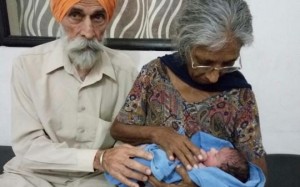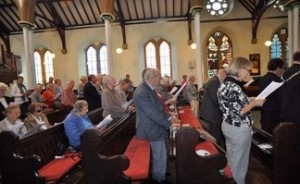If, as the experts say, we’re going to be living longer, we can expect to be doing a lot of things later in life than we expected. But becoming the world’s oldest new mother at 70?
 70-year-old Daijinder Kaur from Amritsar, India, has given birth to her first child after two years of IVF treatment with her 79 year old husband. They are both delighted. She and Mohinder Singh Gill have been married for 46 years, felt the stigma of infertility in India. Now they feel that God has heard their prayers. ‘My life feels complete now,’ said Daijinder Kaur, ‘I am looking after the baby all by myself. I feel so full of energy.’ I wonder what she’s taking. Most new mothers want to sleep for a week.
70-year-old Daijinder Kaur from Amritsar, India, has given birth to her first child after two years of IVF treatment with her 79 year old husband. They are both delighted. She and Mohinder Singh Gill have been married for 46 years, felt the stigma of infertility in India. Now they feel that God has heard their prayers. ‘My life feels complete now,’ said Daijinder Kaur, ‘I am looking after the baby all by myself. I feel so full of energy.’ I wonder what she’s taking. Most new mothers want to sleep for a week.
In 2008, in Utter Pradesh, another couple had IVF treatment and Omkari Panwar, 72, gave birth to twins, a boy and a girl. Omkari and her husband Charan Singh Panwar, 77, already had two grown-up daughters and five grandchildren, but were desperate for a son and heir. [i]
The stigma of infertility and the relatively affordable IVF treatment in India (compared with the West) are the reasons couples are seeking treatment later in life, according to Hugh Thompson, writing in The Times.[ii] He notes it is one of many other changes taking place in the country.
The saddest is that many urban families are choosing not to follow the traditional route of taking in their parents and extended family, and as a result ‘nursing’ homes are springing up across the country in greater numbers.’ ( For nursing homes, read care homes.) In his book, ‘Being Mortal’, American surgeon Atul Gawande writes about visiting India and finding hundreds of older people abandoned by their families, living in virtual warehouses.
There are also ‘gated communities’ for elderly Indians who want to socialise with people their own age.’ But why should older people, who have lived alongside all the generations their whole lives want to live solely alongside people their own age? I believe it is a myth. Older people want the comfort of homes adapted to their changing physical needs, and the security of not being at risk from thieves or thugs. But ideally, that’s how they should be able to live in the community, watching the children growing, chatting with the parents, shopping and getting around with the others. When, or rather if they become very frail and need specialist care, then they’ll need care homes: but not like those Gawande described, homes like ours. www.pilgrimsfriend.org.uk 
We don’t read about care homes or gated communities in the Bible. I don’t believe it’s the way God intended older people to live, huddled together. But doesn’t it say a lot about our society that they feel their needs are best met when they’re living separately from us?
[i] http://news.bbc.co.uk/1/hi/world/south_asia/7491782.stm
[ii] The Times, Thursday May 12 2016














